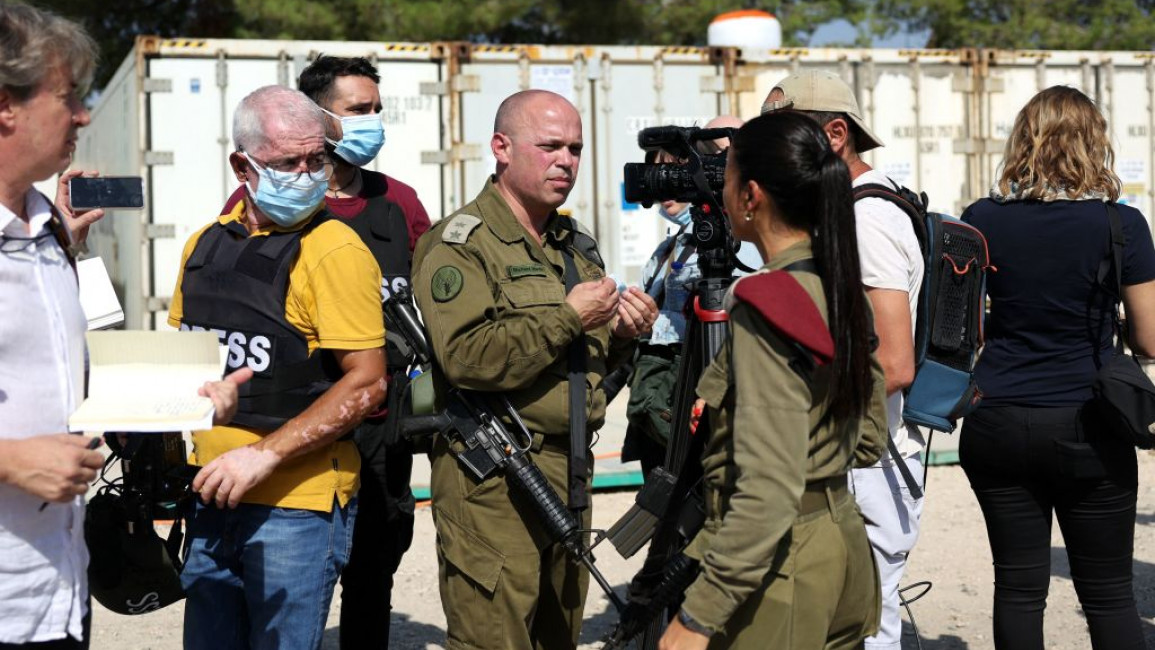Why do Israeli government spokespeople have British accents?
As Israel declared war on Hamas on October 7 the government’s media and communications team scrambled to decipher how they would best project Israel’s message to the Western world to justify their brutal assault on the Gaza Strip.
In keeping with previous wartime efforts, Israeli officials with British or American accents were brought front of stage as part of a strategy to ensure effective and convincing communication with Western media to make sure their governments are ‘on side’ with the war on Hamas.
One spokesperson who has caught the attention of listeners for his strong Scottish accent is Lieutenant Colonel Richard Hecht who is the Israeli military's international spokesperson.
Appearing as a talking head in his military fatigues on the likes of CNN and BBC in recent days, Hecht has become versed in defending the Israeli army's operations and tactics in its indiscriminate bombing and "complete siege" of the Gaza Strip which has seen refugee camps, hospitals, bakeries and places of worship targeted.
In a widely shared interview with CNN on Israel's strike on the Jabalia refugee camp, Hecht responded to reporter Wolf Blitzer’s questioning on why Israel went ahead with the strike despite knowing there were civilians present.
“This is the tragedy of war, Wolf,” Hecht responded.
CNN anchor Wolf Blitzer left stunned as Israeli military spokesman defends civilian massacre at Gaza's Jabalia refugee camp in Israeli strikes pic.twitter.com/dri99CBPE9
— TRT World (@trtworld) November 1, 2023
Speaking from his office in Tel Aviv, the Israeli-Scot navigates the questioning lines of reporters by often reverting to Hamas’s attack as the raison d’etre for Israel’s killing of over 8,700 Palestinians in Gaza, the majority of women and children,
His strong accent is characteristic of Hecht’s birthplace in the city of Glasgow in Scotland. Hecht’s family emigrated to Israel in the 1980s to make their ‘aliyah’, in which members of the Jewish diaspora are welcomed into Israel with automatic citizenship.
The family left the Glasgow suburbs to live on a kibbutz in the Golan Heights, Syrian territory captured by Israel in 1967 and illegally occupied since then.
In an interview with Jewish News from August last year, Hecht said that it was during that period the family ‘became Israelis’ , following 'socialist customs' of the time which allocated children separate sleeping quarters from their parents.
Hecht’s role means he regularly posts on social media, sharing updates from the Israeli army's operations room and ensuring information is reaching Western audiences.
It was Hecht who organised the controversial press briefing in which foreign journalists were shown graphic footage of Hamas’s attack in southern Israel on October 7, in which 1,400 civilians were killed.
Writing on X he said: “Military spokespeople usually need to decide what to release based on risk of intelligence or capability exposure, not on how gruesome a picture is. Today we shared horrific footage from the Hamas attack with over 200 reporters. Because we must bear witness.”
He added later: “The event of showing the press the Massacre isn’t something we felt comfortable doing, but was necessary.”
Squeezed in among serious operational updates and purported intelligence-gathered videos of Hamas underground bases are pictures of Recht’s breakfast and favourite British chocolates which he shares with his 40 thousand followers.
Adding to his roster is a newly opened Substack account, where he describes himself as a “proud ex-Glaswegian Israeli and slightly more than occasional consumer of full English breakfasts on the Mediterranean coast.”
The blogs are titled ‘Mission Briefs’ and written in a conversational and chatty tone:
“I can promise you backstage access to the Israel Defense Forces....and to what a proper English breakfast looks like.”
As well as offering updates regarding targets in Gaza and Hezbollah border attacks, the lieutenant colonel shares ‘Quote of the Day’ and ‘What I’m Reading’ sections with links to articles on the conflict, mainly from American media outlets like the New York Times and CNN.
“Despite repeatedly being told (and shown!) that attacks in the north will be met with severe response, Hezbollah continues to launch and plan attacks from Lebanon,” Hecht wrote.
Hecht is not the only British-born Israeli tasked with relaying the government agenda to the international press pack.
From Gaza, Scottish first minister's mum-in-law says sending 'last video'https://t.co/bpTrwlIieb
— The New Arab (@The_NewArab) October 13, 2023
Eylon Levy, a graduate of both Oxford and Cambridge universities, was appointed at the start of the war as a government spokesperson and his Queen’s English accent has been heard across the UK media including on BBC Radio 4, Sky News, Channel 4, and LBC radio, among others.
He was brought on specifically for his British accent and background amid concerns there were communication difficulties in projecting Israel’s memos to foreign media.
Along with other government social media channels, Levy shares graphic images with descriptive posts which detail gory accounts of Hamas’s October 7 attack.
The style is part of a deliberate Israeli government PR strategy to scare and shock international followers, and most importantly Western governments, into unreservedly backing Israel’s assault on Gaza.



